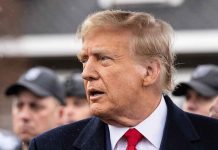
Donald Trump claims Mexican President Claudia Sheinbaum turned down U.S. military aid due to cartel influence concerns.
Key Takeaways
- Trump accused Sheinbaum of rejecting U.S. military aid due to fear of cartels.
- Sheinbaum emphasized Mexico’s sovereignty and refusal of foreign military presence.
- Trump increased U.S. military presence at the border to combat cartels.
- Both leaders agree on U.S.-Mexico collaboration without military imposition.
Allegations and Rejection
Donald Trump alleged that Mexican President Claudia Sheinbaum turned down an offer to send American troops to help combat drug cartels in Mexico. Trump believes that Sheinbaum’s reluctance stems from fear of the cartels, which he claims hold significant influence over her decision-making. The proposal involved American military presence to dismantle cartels and halt the trafficking of illicit drugs, including fentanyl, into the United States.
Trump has criticized Sheinbaum for her apparent fear of the cartels, suggesting this affects her leadership. However, Sheinbaum firmly stated her decision was based on protecting Mexico’s sovereignty. She opposed any foreign troops on Mexican soil while acknowledging the need for cooperation with the U.S. in battling drugs and violence.
“No, President Trump, our territory is inalienable, sovereignty is inalienable. We can collaborate. We can work together, but with you in your territory and us in ours. We can share information, but we will never accept the presence of the United States Army on our territory,” remarked Sheinbaum.
Trump: "The president of Mexico is a lovely woman, but she is so afraid of the cartels that she can't even think straight." https://t.co/D1yt5TClRr
— NEWSMAX (@NEWSMAX) May 5, 2025
U.S.-Mexico Collaboration
While declining military intervention, Sheinbaum stressed the importance of cooperation between the U.S. and Mexico in combating drug cartels. She expressed willingness to share information and work closely with American officials. President Trump, on his part, reiterated his commitment to help Mexico should they request assistance, labeling the cartels as “evil” entities threatening both nations.
“They are bad news. If Mexico wanted help with the cartels, we would be honored to go in and do it. I told her that I would be honored to go in and do it. The cartels are trying to destroy our country. They’re evil,” said Trump.
Trump has shown unwavering determination in addressing the cartel issue, evidenced by his decision to enhance military presence along the U.S.-Mexico border. This move aims to tackle illegal immigration and stem the flow of drugs like fentanyl. In February, Trump designated numerous drug cartels as foreign terrorist organizations, intending to amplify law enforcement measures against them.
The Path Forward
Despite the differences in approach, both leaders have expressed commitment to resolving the issue of cartels and drug trafficking. Trump and Sheinbaum continue to engage in dialogue while maintaining their respective stances. As Republicans push for a tougher stance on Mexican cartels, the path forward necessitates a balanced collaboration that respects the sovereignty and interests of both nations.
Addressing the cartel threat remains a priority for both countries. With Sheinbaum emphasizing sovereignty and Trump keen on cooperation, the hope is to find effective solutions that do not undermine Mexico’s territorial integrity, while safeguarding American borders and citizens from the cartel menace.





